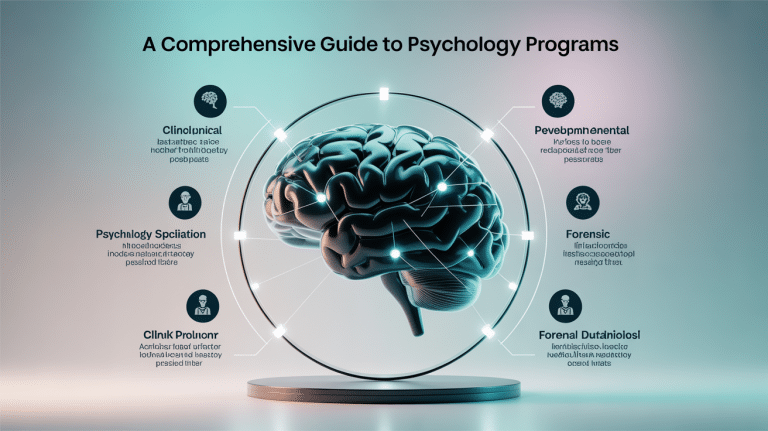A Comprehensive Guide to Psychology Programs
What is Psychology?
Psychology is the scientific study of the mind and behavior. As an academic discipline, it explores various aspects of human life, including mental processes, emotional responses, social dynamics, and the relationships between individuals and their environments. Psychology programs typically blend theory with practical application, preparing students for various roles within healthcare, education, business, and social services.
The program often emphasizes critical thinking, research methodologies, and ethical considerations, ensuring that graduates are prepared to make informed decisions in their future careers.
What Do You Study in Psychology?
Psychology programs generally cover a range of topics, allowing students to delve into various subfields, including clinical psychology, cognitive psychology, developmental psychology, and social psychology. Below is a detailed breakdown of what students can expect to study during their program.
Core Subjects
- **Introduction to Psychology**: Overview of psychology as a science, including major theories and branches.
- **Developmental Psychology**: Study of human development across the lifespan, from infancy to old age.
- **Abnormal Psychology**: Exploration of psychological disorders, their symptoms, and treatment approaches.
- **Social Psychology**: Examination of how individuals interact with one another and how social contexts influence behavior.
- **Research Methods in Psychology**: Introduction to research techniques, data analysis, and ethical standards in psychological research.
- **Statistics for Psychology**: Fundamental statistical concepts and their application in psychology.
Elective Courses
- **Cognitive Psychology**: Focus on mental processes such as perception, memory, and problem-solving.
- **Health Psychology**: Exploration of psychological factors that affect health and illness.
- **Forensic Psychology**: Application of psychological principles within the legal and criminal justice systems.
- **Educational Psychology**: Study of how psychological principles can be applied to educational settings.
- **Neuropsychology**: Investigation into the relationships between brain function and behavior.
Labs, Workshops, and Internships
Practical experience is a significant component of psychology programs. Many universities offer:
- **Laboratory Courses**: Hands-on labs for research methodologies where students can gain practical skills in conducting experiments and analyzing data.
- **Workshops**: Skill-building sessions focused on specific therapeutic techniques or psychological assessments.
- **Internships**: Opportunities to gain real-world experience in clinical settings, research environments, or community services.
Careers After Psychology
Graduates with a degree in psychology can pursue various career paths across multiple sectors. Some of the common job titles include:
- Clinical Psychologist
- Counseling Psychologist
- Educational Psychologist
- Organizational Psychologist
- Forensic Psychologist
- Research Assistant
- Human Resources Specialist
- Market Research Analyst
- Mental Health Counselor
Salary Expectations
Salary ranges for psychology graduates can vary widely based on the job title, experience, and geographical location. Here are average salaries for psychology professionals (converted to USD and EUR):
- Clinical Psychologist: $75,000 – $105,000 (USD) / €66,000 – €93,000 (EUR)
- Counseling Psychologist: $70,000 – $95,000 (USD) / €62,000 – €84,000 (EUR)
- Educational Psychologist: $65,000 – $90,000 (USD) / €58,000 – €80,000 (EUR)
- Forensic Psychologist: $80,000 – $120,000 (USD) / €70,000 – €105,000 (EUR)
- Market Research Analyst: $60,000 – $85,000 (USD) / €52,000 – €74,000 (EUR)
Is Psychology Hard to Study?
The complexity of studying psychology can vary depending on a student’s background and aptitude for subjects like statistics, research, and critical thinking. Common challenges include:
- **Statistical Analysis**: Psychology involves a significant amount of data analysis, which may be challenging for students without a strong background in mathematics.
- **Understanding Theories**: The diversity of theories and models in psychology may be overwhelming for some students, requiring them to engage in critical analysis and comparison.
- **Internship Competitions**: Internships are crucial for practical experience, and securing a good placement can be competitive. Students should proactively seek opportunities early in their studies.
Required Skills
Success in psychology requires a blend of soft skills and technical knowledge, including:
- Strong communication skills
- Critical thinking and analytical abilities
- Compassion and empathy
- Patience and problem-solving capabilities
- Understanding of ethical considerations in research and practice
Preparation Tips
To prepare for studying psychology:
- Take introductory psychology courses in high school or online.
- Enhance your mathematical skills, especially in statistics.
- Engage in volunteer work that involves interaction with people in various settings.
- Stay informed about current research in psychology through journals and articles.
Top Certifications After Psychology Graduation
While a degree in psychology provides a solid foundation, many graduates may choose to pursue certifications to enhance their employability and expertise in specific areas. Common certifications and requirements include:
- **Licensed Professional Counselor (LPC)**: Requirements vary by region but often include a master’s degree, supervised experience, and passing a licensing exam.
- **Board Certified Behavior Analyst (BCBA)**: Requires a master’s degree in psychology or a related field, supervised fieldwork, and passing the BCBA exam.
- **Certified Addictions Counselor (CAC)**: Certification tailored for professionals working with addiction-related issues, requiring specific coursework and experience.
- **National Certified Counselor (NCC)**: Requires a master’s degree and passing the National Counselor Examination (NCE).
Where to Study Psychology
For students interested in pursuing psychology, several top private universities in Turkiye offer robust programs. Here are some notable institutions:
Take the Next Step with Study in Turkiye
Explore further to find the right psychology program for you in Turkiye. Take your first step toward a rewarding career in psychology today!



